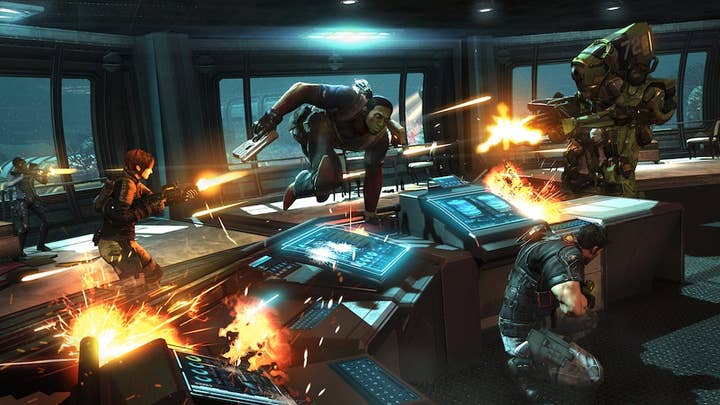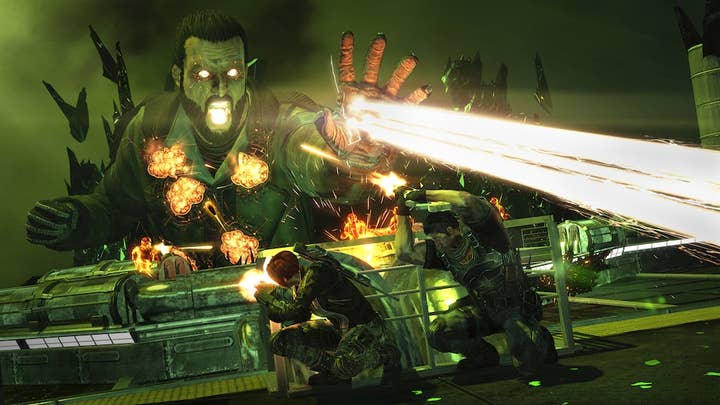Ted Price aiming to offer "something fresh" among a "sea of sequels"
Insomniac boss not worried about launching new IP at end of console cycle, says gamers have been playing the same games for last 6 years
Last year, Insomniac Games decided to rebrand and retool its first owned IP in the console space. Fuse, formerly known as Overstrike, will be shipping on PS3 and Xbox 360 this May, and Ted Price is more than aware of the challenge the game will face as a new IP at the tail end of a console cycle. BioWare co-founder Greg Zeschuk recently admitted that he would have wanted Jade Empire to launch on Xbox 360, and we have to wonder if Ted Price is in the same situation with Fuse.
Price, speaking to GamesIndustry International at GDC, stressed that the game's unique approach will be enough to attract gamers despite a challenging console marketplace.
"There's no question that it's a challenge. There are plenty of news items to take gamers' focus off of this generation. For us, the opportunity was to be a new IP in a sea of sequels, offer something very fresh for players to check out when they've been playing, essentially, the same games for the last 5 or 6 years," he said. "What we wanted to do with co-op in particular was raise the bar and offer features that no other co-op games are offering at this point. Fuse was a great opportunity for us to do that."

And there's no denying that launching new IP at any time, let alone at the end of a console cycle, is going to be a big risk for a developer. Price, however, remains confident. After all, you can't build up a brand and a franchise without taking the plunge with a new IP at some point.
"Everybody's approach and response at the very beginning of each of [our] franchises was to ask the same question: Is this IP going to do well? What's it all about? Boy, this is a risk to take. And, in every case, we stayed focused and did the best we possibly could to build the right story, build gameplay that does something better than other games and that helps the franchise stand out in some way, and then we've continued to take each of those franchises in different directions because, for us, that's what we enjoy doing. So its really nice to look back at Resistance and Ratchet and say, 'Those franchises did well.' But, when we released the first games in each of those franchises - and I'll throw in Spyro as well - we had no idea what was going to happen. We really didn't. And that's both the exciting and scary part of being a new IP creator," he said.
"There's a lot of negativity thrown towards the console market right now, [but] it's still a place where people go for high quality entertainment. I don't think that's going to change"
Just as Ratchet & Clank and Resistance became popular franchises among core gamers, Price said he fully expects Fuse to join their ranks. Price wouldn't commit to next-gen consoles, but it's easy to assume that as the next logical step if the first Fuse is received well. "We're not expecting to stick to just one platform or existing platforms. We would like to take this franchise further, expand the universe, experiment with it. That's what keeps us going in general when it comes to being an independent developer," he noted.
And indeed, while Insomniac has dabbled in social and mobile, Price and his team are console developers at heart. That, in and of itself, can be a scary thing. When Tomb Raider sells 3.4 million copies and that's not enough for Square Enix to break even, and when both EA's John Riccitiello and Square Enix's Yoichi Wada have to step down in quick succession, it's clear that something's awry with console publishing and the health of the business. Price is just taking it all in stride.
"We take the long view. Yes, I will agree, the console market is challenging. But when we build IP, it's with the long view in mind. The other thing that we have done is we've begun to branch out. So with Outernauts, we took our first stab at the free-to-play market and we are now bringing Outernauts to mobile. And we as a company absolutely acknowledge how fluid the market has become and we need to stay flexible and nimble and continue to try out new things. And I think you're seeing that from everybody who has been in the 'traditional' development industry now. People are trying different things and it's interesting how tough times really drive innovation and change," Price commented.
As Price pointed out, developers do need to experiment and try new things, as the market is evolving rapidly, but those experiments shouldn't come at the expense of a studio's main expertise. "We're absolutely interested in experimenting, and I think Outernauts demonstrates that, but we also know where our core competency has lain for the last two decades, and that is in creating story driven, action oriented console experiences, and we have a brand that a lot of players look to to provide those kinds of experiences," he continued.
"So even though we are moving into mobile and are experimenting with free-to-play, we are continuing to refine our abilities in that console space and believe that even though the console market - there's a lot of negativity thrown towards the console market right now, it's still a place where people go for high quality entertainment. I don't think that's going to change. It's certainly getting more difficult to stay in the top echelon of games, but in many ways it's like summer blockbusters for movies. You've got people who really do want those story driven, bigger than life experiences and currently, PC and console is the place to find those."
"I'd say that what Sony is doing is a very positive note for the console industry and I think it mimics what most of us in the traditional game development business are doing, and that's thinking differently about how the future is going"
As a developer who was Sony exclusive for many years, it may not come as a surprise that Price seems to be particularly excited by what Sony's doing with PS4. That said, many of Price's sentiments on PS4 have been echoed by other developers of late.
"You pointed out the slide of the consoles... this worry that consoles are on a downward trend. I'd say that what Sony is doing is a very positive note for the console industry and I think it mimics what most of us in the traditional game development business are doing, and that's thinking differently about how the future is going - how we want to exist in a future where mobile and free-to-play and different methods of delivery are such an important part of the industry. So we are all becoming much more versatile and flexible as developers and businesspeople and taking off the blinders in terms of who we are. I think you can see that in Sony as well in terms of their console approach," he remarked.
Even if developers are becoming more versatile and flexible, as Price implies, if the industry keeps producing the same types of games over and over, it's certainly a problem. As Warren Spector has asked, "where are gaming's grown-ups?" and where are the games with real meaning? Price doesn't believe that assessment is entirely fair, however. While many, many games focus on combat, that doesn't mean that they don't have a serious story, he countered.
"I think it's easy to overlook the story and messages that are in a lot of games that may be perceived as purely combat. Fuse has a story-driven game and it asks the question, 'What happens when humans get their hands on this substance they were never supposed to have? How do people use and abuse unlimited power?' And each of the characters in the game are affected in a very different way by Fuse, and you see that as the story unfolds. But often, people are distracted by the veneer of a purely combat focused game," he said.

He continued, "I think when you play the games, versus looking at them from the outside, as a lot of non-gamers do, you get that. I'll give you another example: Outernauts, the free-to-play game we released on Kongregate and Facebook, asks the question, 'What is our place in the universe?' It's driven by a story but at the end of the game, that is ultimately what you are left with, that question. And we spent a lot of time making sure that comes through. Not in an overt way. We're not asking you to ask yourself in the beginning of the game that question, but by the end we believe players will ask those questions. And I think there are many, many other games where developers are using their own experiences and their own questions that they have about life and integrating them into the stories. And regardless of the level of action. That's what's been so wonderful about the evolution of games over the last two decades. We have better tools to work with now. And I think our audience appreciates it too."
Insomniac currently employs around 220 people, and Price isn't anticipating a big change in that number one way or another, even with next-gen on the horizon.
"We've been at that same size for several years and we enjoy that size because we've got a number of teams who are focused on games, on franchises. We've got a North Carolina studio, and our Burbank studio, and it's a very manageable size from a corporate culture perspective because communication is quick - we as a company are small enough to be nimble and make changes when necessary, but we also have this size to make games like Fuse, which is not a small game. Or some of the other franchises we have built. That size also gives us the chance to experiment and try out different things, which is now more and more necessary in this evolving business," he said.
Next-gen doesn't mean budgets and team sizes have to balloon either. It all depends on what types of games are made. "You don't need a massive team to make a fantastic game. Journey. Perfect example, right? The Walking Dead. There are many, many games out there that are delivering triple-A content that are working with small, nimble teams - and that's exciting. I don't think you have to spend $200 million to have a game that players love and will continue to play for a long amount of time."

